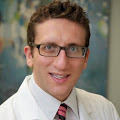In The News
STATEN ISLAND, N.Y. – Dr. Rodney Samaan is one clever fellow.
Literally.
He graduated from Centre College in Danville, Kentucky, and earned his medical degree from the University of Kentucky. He went on to get his master’s degree in public health at the University of Alabama at Birmingham. He’s a board-certified internist and board-eligible pediatrician. And right now, he just finished a three-year course of specialized training, known as a fellowship, in cardiology — the study of the heart — at Richmond University Medical Center (RUMC), West Brighton.
Dr. Samaan, 35, will admit that he’s taken time finding his niche in the wide-ranging field of medicine, but in the end, he was drawn to what he believes drives a person’s health: Plumbing.
“Arteries send blood out. Veins bring it back,” he said. The heart provides the pumping action.
It sounds simple, but as Dr. Samaan admits “everybody is different.” While the plumbing works well for many, other people don’t fare nearly as well — some because of genetic risk factors, others because of unhealthy lifestyles and still others, because of an accident or combination of the above.
The number one and three killers of people are heart attacks, stroke and other forms of cardiovascular disease, claims Dr. Samaan. “Most people will die from” one of these. Cancer is the number two killer overall, said Dr. Samaan.
And it doesn’t matter where you live. “Cardiology is pervasive; it’s needed all over the world,” said Dr. Samaan. “Even in Africa, heart disease is going to overcome AIDS as the number one killer,” he said.
Dr. Samaan said the key to managing heart health is to start early in life. He said he thought long and hard about staying on Staten Island after his fellowship concluded and opening an adolescent and adult cardiology clinic on the North Shore, but in the end, he decided the less risky move, financially, was to accept a position as an invasive cardiologist with a practice closer to his family in Glasgow, Kentucky.
WHAT’S A FELLOW?
Fellows are medical doctors who want to get hands-on practice in a sub-specialty in a clinical setting.
At RUMC, Dr. Samaan and other cardiology fellows assist practicing cardiologists and see patients with heart problems; they run stress tests, echocardiograms and angiograms. To be board-certified as a cardiologist, a physician must have logged six years of additional training, following medical school.
Many hospitals offer fellowships, so physicians can get get paid while receiving extra, highly-focused training. At Richmond University Medical Center, fellowships are offered in gastroenterology, cardiology, nephrology and hematology and oncology, according to Dr. Samaan.
According to a hospital spokesman, Staten Island University Hospital offers fellowships in cardiology, geriatrics, hematology and oncology, pulmonary medicine, renal diseases and vascular surgery. Last month, the hospital graduated 11 fellows.
Dr. Samaan said he was inspired to switch to cardiology by mentors at Case Western Reserve University in Cleveland, Ohio, where he spent four years training in a combined pediatric/internal medicine program. He applied to the former St. Vincent’s Hospital in Manhattan for a fellowship, and ended up securing a spot at Richmond University Medical Center, which used to be affiliated with St. Vincent’s in Manhattan.
BACKGROUND NOTES
Dr. Samaan has covered as much ground in his personal life as he has in his professional. Born in Jordan, he is the youngest of 12 children.
Dr. Samaan’s mother was a housewife and his father, retired from the Jordanian army. He moved to Yonkers as a child with most of his family, following the lead of one of his older brothers. At the age of 7, the Samaans relocated to Kentucky.
A huge advocate of exercise, he’s participated in marathons and triathlons; he’s also an avid bike rider. Once a year, he signs on for one week as a physician with the Carnival cruise line, traveling to various ports-of-call. He’s worked in the jungle in Ecuador, and presented research in South Africa. In addition to English, he’s fluent in Spanish and Arabic. He also did a stint as a medical researcher for ABC news, and wrote several health columns on the heart for the Advance during his stay on Staten Island as a fellow.
Other than recommended age-appropriate screenings, Dr. Samaan is not a big fan of annual physicals. “They’ve never been proven to be beneficial,” he said.
Rather, he believes, “People need to listen to their bodies and the signals it gives you.”
Men, he said, are particularly bad at this. “Most visits to the doctor are women,” he said.
He also urges people to donate blood. In addition to the fact that it’s a good, community-minded thing to do, Dr. Samaan says that just like too little blood is bad for a person, so is too much — although he admits that this is a controversial issue within the medical community. He believes that donating keeps everything in balance.
Which sounds something like a prescription he might write for a healthy life.
Dr. Samaan maintains a health blog at http://rodney-samaan.blogspot.com.


